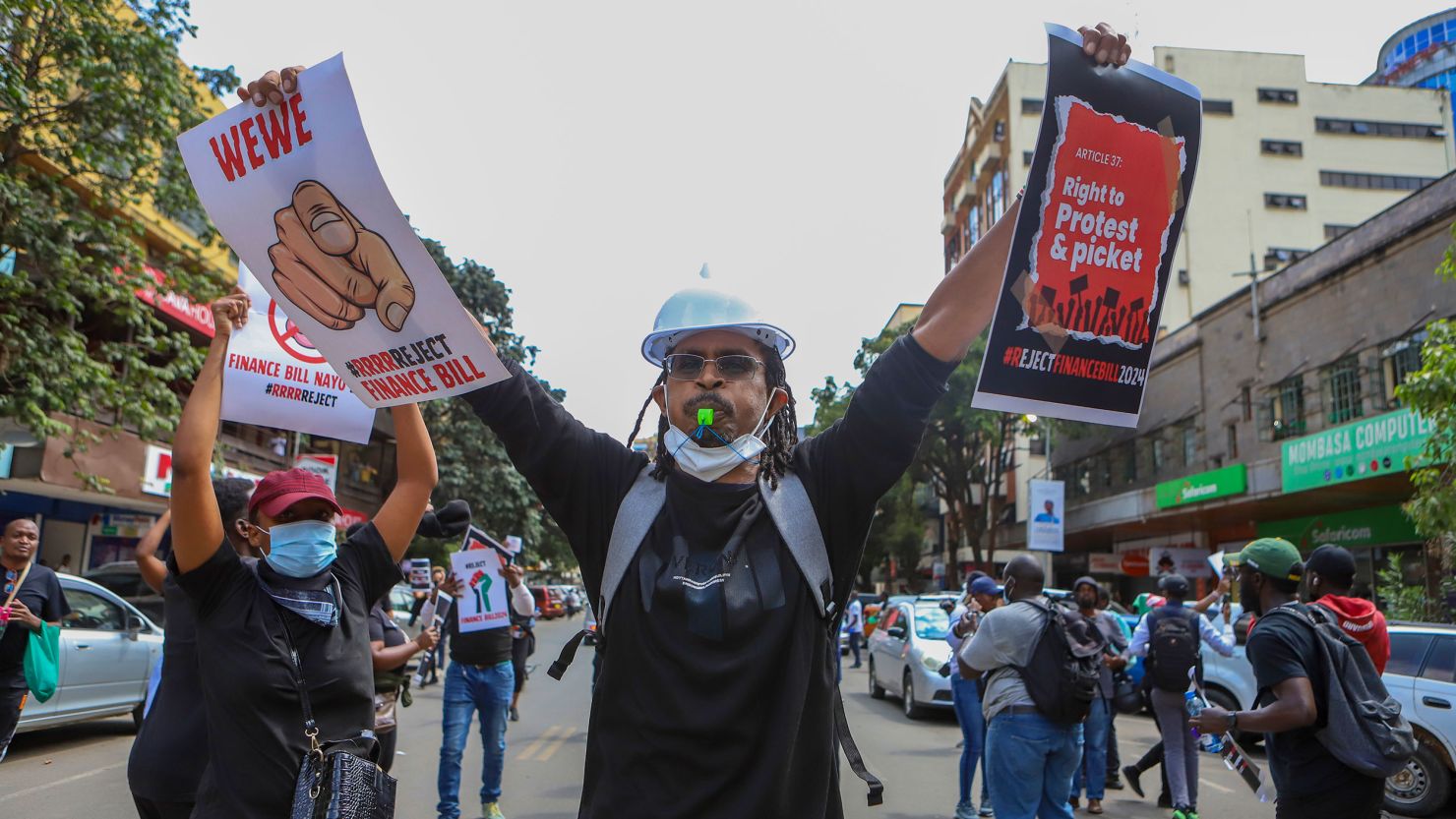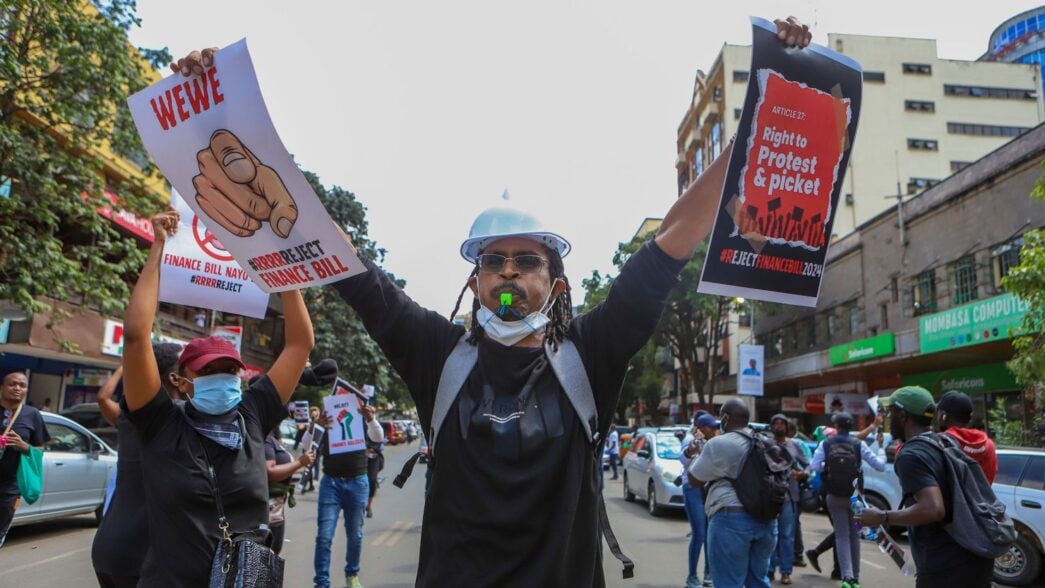Kenyans protest tax rises
Kenya, one of Africa’s political and economic powerhouses, has captured the attention of the world for weeks. Even when the dust and smoke finally settle, it’ll be difficult to quickly walk away from the impact so soon. That is, if this moment does not become a defining one, an indelible landmark in the history of the East African country. The trigger was the proposed law called Finance Bill of 2024, now rested. At its heart was the move to boost taxation to include a 16 percent Value Added Tax (VAT) on commodities like bread, potatoes, onions, tomatoes, eggs and petroleum products; a 15 to 20 percent charge on mobile money transfers and similar services. Not to mention some other essential items.
Watchers and students of socio-economic trends should be interested in the progression of the mayhem that has engulfed the nation for which an iconic Pan-Africanist, Jomo Kenyatta, and others fought to achieve independence decades ago. Of course, the role of the internet in the mass mobilisation especially of the youth population can’t be discarded. From #RejectFinanceBill to #TupataneThursday to #RutoMustGo, the recent events appear to be orchestrated. Yet, the protesters insist that the movement isn’t pre-planned. Neither does it have any identifiable leadership. Remarkably, proofs haven’t emerged to disprove that claim.
The first hashtag brought the populace to the knowledge of the legal instrument that could further undermine their capacity to lead reasonably decent lives. They stepped out of their comfort zones and physically engaged the law enforcement officers on the streets. Why sit in the embrace of timidity and fear and fritter away a chance to participate, albeit confrontationally, in deciding their own fortunes and those of future generations? When they discovered that the pledge by President Ruto to withhold his assent was actually shrouded in innuendos and insults, the people who had welcomed the helmsman with fanfare only two years ago decided that he wasn’t a man to do any serious business with.
The second hashtag which means, “see you on Thursday” was a direct threat to the law makers for modifying the bill on June 18 and ratifying it just six days later, against common sense and the loudly expressed wishes of the people they claimed to be representing. That warning was promptly executed with exactitude and viciousness. The hungry, weak and vulnerable had truly found their muscle. In a manner suggestive of revolutions and mob actions, they descended on the parliamentarians with an unshakable intent to desecrate the hallowed chambers. On that day of wanton fury, it wasn’t only the towering building housing the national legislature that suffered massive damage and burns, it was also the continuation of the termination of souls by the personnel in uniform and destruction of both private and public property at numerous locations throughout Kenya by irate people. The “treasonous criminals” that President Ruto publicly blamed, a hasty characterisation he regretted rather belatedly, were on duty.
Advertisement
The third social media call was a derivative of the other two. In the hearts and minds of many Kenyans, the man they had strongly rooted for in 2022 had fallen from grace. For, they were not a party to the decisions that walked everybody into the trap of the International Monetary Fund (IMF), a body notorious for giving Third World countries questionable antidotes for escaping self-inflicted economic quagmires. The Fund had advised Ruto’s administration to increase the tax ratio to the gross domestic product, GDP, from 13.5 to a minimum of 20 percent in order to generate over two billion USD and also to slash the fiscal deficit significantly. At present, Kenya owes nearly 70 percent of its GDP to local and foreign creditors. China alone accounts for close to six billion USD. These are among the weights awaiting Kenyans who now insist that they deserve to know, as a fundamental human right, the details of the expenditure.
What is largely responsible for Kenyan conflicts is the failure of the leaders, like most of their counterparts in Africa and elsewhere, to wake up to the reality that democratic practice goes with not only the civic responsibilities of the citizenry but even the critical obligations of the representatives and executives to govern responsibly. That entails a show of sensitivity, competence and transparency.
Politicians, notably in developing and underdeveloped spheres, often blame dissent or protestations on the wiles and un-patriotism of their rivals. Sadly, this self-serving mindset usually blinds them to the capability of the masses to throw caution to the wind and vent their frustrations in various ways.
Advertisement
One of the strongest voices to have come out of Kenya in the heat of the current chaos is that of Senator Crystal Asige, a visually-challenged member of parliament. The award-winning musician, disability rights advocate and public speaker once declared: “When I lost control and everything around me started to disappear, my voice remained. Glaucoma made me understand my ability to, and the importance of, standing alone. I think I was given this mountain so that I can show others it can be moved.” The other day, she had a unique privilege to be the mouth of the downtrodden when she delivered what qualified for speech-on-marble the on the floor of the legislative house. Her words read in part: “As a youth in this house, I am speaking for the youth outside this house. We cannot go on recess and it’ll be completely insensitive to do so…. Darkness fears democracy….
“This last week had me aching with desire to see my fellow youth in the most spectacular display of patriotism, camaraderie and putting up a first-rate masterclass of demanding that government be held to account for the world to see and, yes, it has seen. But unity has been violently gunned down on the streets, not by men but, by monsters who had no concern for human life…. Young Kenyans have looked their oppressors in the eye and shown them that when it comes down to the wire, there are only two times to be brave: when you feel like it and when you don’t…. The arrogance from some of these top government officials has been outrageously condescending to some of these young people and disgusting and reminiscent of narcissistic abuse….” This can’t get punchier. She could well have spoken for all hapless citizens of nations where security operatives are periodically marshalled to forcefully and violently quell protests against real or perceived mis-governance.
Here are some of the anti-Ruto chants that have risen from persons united by defiance, courage, and a certain conviction of shared destiny. After all, an African adage affirms that if a goat, ordinarily a friendly animal, is chased to the wall, it will turn around and face its predator squarely to bite it. A cocktail of defiant utterances: “People are dying in the streets and the only thing he can talk about is money. We are not money. We are people. We are human beings.” “He needs to care about his people, because if he can’t care about his people then we don’t need him in that chair.” “There hasn’t been any indication by the government that it is going to take the calls to deal with corruption seriously. We are determined to push for the president’s resignation.” “We hope for a peaceful protest and minimal casualties, if any.” “The youth have given our country its last best chance. We either seize it and swim with it by implementing all their demands, or we ignore it and sink the country altogether”, Raila Odinga’s Orange Democratic Movement (ODM), Kenya’s foremost opposition party, pronounced in a statement.
That’s a timely, decisive declaration that all the mediocre governments on the continent should listen to urgently.
Advertisement
Ekpe, PhD, is a member of THISDAY editorial board.
Views expressed by contributors are strictly personal and not of TheCable.
Add a comment










